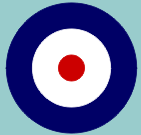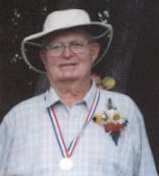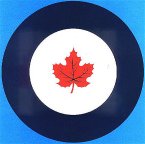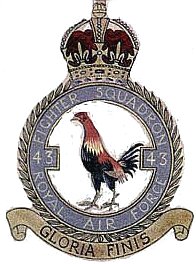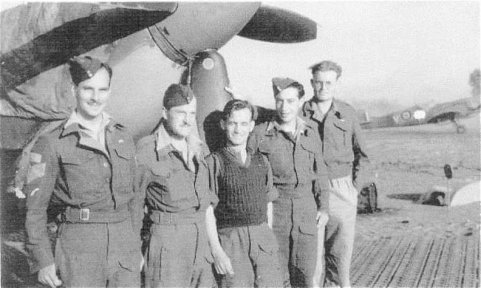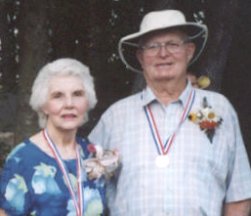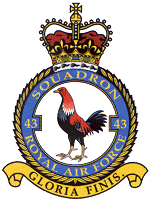An 'other ranks' memories of
43 Squadron
1942- 1945 [sixty years later]
Part II
Our next move was to the airfield at Naples, within sight of Vesuvius.
We slept on the airfield for some time in our two-man pup tents. Early
in the morning, the locals picking mushrooms around us would awaken us.
As the 'heavies' crowded us out we were moved into a school where we stayed
until after Christmas. I remember standing under an archway one night when
bombs were falling close. A local set up shop one day, across from the
school, fixing watches, and since mine wasn't working I gave it to
him. I watched as he took every piece out, brushed each, put it back together,
wound it and handed it back, running.
We had left most of our kit in Africa; around the first of December
we heard that our kit was at Bari. A truck was sent to pick it up, but
he arrived late so waited until the next day. That night there was a raid
that sunk seventeen ships so we never did get our kit. We never got the
full story about that raid but it's on the Internet now. We could buy eggs
on the street and we would sometimes buy a couple and give them to the
cooks to fry for us in the inch or two of grease that they had in their
large frying pans. There was no talk of cholesterol then.
We found a shop in Naples where they were
making fold-up camp cots. They were reasonably priced. so quite a few of
us bought them -- they kept us off the damp ground. They would have been
good at Maison Blanche when we had water in the tent, although it would
have been awkward taking our rubber boots off. At one time though when
we were in the French Alps on our way from Lyons to Marseilles to go back
to Italy, we were stopped for several days at a spot where a cool wind
blew continually. I was cold the first night, so for the rest of the time
there, I slept on the ground. It was dry and warmer.
We found that the best way to use our two blankets was to lap them halfway,
sleep on the double ply and pull the other halves over us from each side.
We had been issued with palliasses, the covers only, but had found some
straw to fill them. More than a year later mine didn't smell too good,
I didn't think it was just me so emptied it out and found a dead lizard,
there was no straw available at that time, so I returned the straw after
removing the lizard. We must have left Naples between Christmas and New
Years. I remember WO Brunt, IC wireless, bringing us a bottle of Cherry
brandy at Christmas when we were in the school and I remember an incident
that happened at New Years when we were in tents.
New Years Day 1944 and we were in tents north west of Naples, less than
a mile from the Mediterranean. We were close enough to Naples to see ack-ack
when they were being bombed and see the smoke from Vesuvius when it erupted
a little later. We could also hear the artillery at Cassino. We had a marquee
for a dining tent and we had eight-man tents rather than our pup tents.
We had kerosene stove in our tent workshop, and since the wireless personnel
were in three different tents we would take turns using the stove in our
sleeping tents, each tent getting it every third night. The other nights
we would use our charcoal burner. The charcoal burner was a tin can about
two gallon size, punched full of holes and with a long wire handle, the
charcoal, we made during the day.
Some large trees had been bulldozed down so we would start a fire with
the drier wood and when it was going good we would throw some of the greener
wood on. Any of the wood that was charred completely through, we would
rake out of the fire and extinguish. We had to make sure that it was charred
completely through or it would smoke in the tent. This charcoal warmed
us twice, once when we were making it and once when we burned it at night.
To use we would use a little gas to start it and once it was started we
would swing it round and round until the charcoal was all aglow, then hurry
inside. As it died down, someone would take it out and swing it until it
was glowing again. We always made sure that there were no aircraft in the
area before we swung it. When we were doing that we would usually see circles
of lights coming from other tents as they swung theirs.
There must have been a party in the Marquee on New Years Eve. We in
our tent had all turned in when we heard Matt and Bill coming back singing
as they had done before, so we decided to pretend that we were all asleep
and maybe they would bypass us. No such luck and soon they attracted a
couple more who crowded in singing. This seemed to go on for quite some
time when suddenly the fellow in the bed beside me jumped up put a magazine
on his sten gun, saying, "I'll get rid if these buggers." By now I was
getting up, we didn't need any holes in our tent, or our friends, but by
the time I grabbed the gun he had the bolt pulled back and my thumb went
into the side in front of the bolt where the empties come out and I thought,
well, it won't fire now but if he pulls that trigger I will have a very
flat thumb, but he let go of it and I took the Magazine off. It had the
desired result -- our serenaders left to look for a more appreciative audience.
I don't remember much of the next little while until we were sent up
to Anzio, I guess nothing much happened. I remember feeling damp for the
most of that winter -- I think we had a spell of 'socked in' weather. We
were trucked off somewhere to see an American USO show, Irving Berlin was
there and sang. And when Vesuvius erupted, truckloads were sent to see
that, but we left for Anzio before I got to go.
I believe that we left from Naples for
our night trip to Anzio. I recall being camped at a spot overlooking Naples
harbour one night when there was a thunderstorm and seeing two barrage
balloons struck by lightning and going down burning. It seemed that there
were always a lot of barrage balloons raised from launches in any harbours
that I saw and I wonder that there was no mention of barrage balloons at
Bari when the German bombers came in very low.
Later on our way to Corsica in July by LST when we spent a night in
the harbour at Civitavecchio, a launch came around at dusk, fogging so
that we were surrounded by a white fog. The landing craft that took us
to Anzio held only six or eight trucks and had no provisions for us, I
have written about that period so will skip to going through Rome.
I think that it was 2:00 A.M. that we were to leave for our trip through
Rome. I thought at the time that it was to ensure smooth traffic flow,
but from what I read now it was to ensure that there were no British uniforms
to be seen in the upcoming photo ops.
I am drawing a blank from June 6 until we left for Corsica in July.
We were near the Med., I have a picture of some of us in trunks that must
have been taken at that time. There was a flimsy makeshift control tower
alongside the airstrip; someone must have been there before us. One day
a B25 landed but was asked to drop his bombs in the sea before landing.
We were in Corsica for three weeks before the Southern France landing,
when the rear party had sent the aircraft off, they boarded an LST and
sat in the harbour most of that time. They then proceeded to France to
meet our aircraft when they left Corsica. We landed on the east coast and
drove across the island on mountain roads to Calvi, going through some
very scenic countryside along the coast. After climbing for some time at
one spot, ahead we could see a village in a bay and our road ahead clinging
to a cliff on the other side of the bay. Our airstrip was close to the
sea so we could walk for a swim. A Lysander was stationed there; at night
we would hear it take off for a trip into occupied France.
On the day of the landing a Dakota towing a glider landed, the glider
was released and landed, mostly on one wheel with a loud crunching sound
but it withstood it, then the Dakota made another pass and dropped the
tow cable before another pass and landing on the landing strip. Later it
took off, with the glider becoming airborne first.
After the landing and when our rear party had found an airstrip, our
aircraft left and we loaded onto another LST. This time when we landed
we were allowed to stay topside. There was no action. Our trucks were all
chained to the decks, as we approached the beach two anchors were dropped
off the stern to assist them to get off the beach if necessary. A stage
had been lowered over the side near the bow with a sailor on it 'swinging
the lead'. He would toss a weighted line forward and as it touched bottom
he would call out the depth of water (by the mark, 10 feet or whatever.)
We stopped suddenly enough for some of the trucks to break their shackles;
one fellow had a leg broken. When we took a road heading north to Lyons
it was lined on the side by burned and burning German equipment, even dead
horses that they had used in their retreat. When we stopped near a town
that night we found a bar and drank and sang with some Maquis and other
locals.
There was dancing in the streets when we first arrived at Lyons, but
then when mass graves of hostages who had been shot, were found, that put
a damper on the celebrations. We went roller-skating several times. When
we were leaving we passed a mass grave that had just been opened on the
airfield.
Half of the squadron had moved up as far as the Swiss border at Besancon
when we had orders to go back to Italy. On our way back we took a more
roundabout way through the Alps, one of our trucks lost its brakes and
rolled down a slope, clipping the truck in front of it. One man was killed
and others injured. We stopped at Avignon one night, it was raining and
we were allowed to sleep in the vacant hospital, the part that had been
cleared of mines. Our group looked around for a suitable spot and ended
up in a room in the basement. I slept on a marble slab in the centre, now
I wonder if I was the only one to ever get off.
When we returned to Italy, we in our truck
were separated from the rest of the convoy of trucks again, and pulled
into an American camp for the night. They were a mobile laundry unit; they
said that if they weren't moving first light they would have washed our
blankets for us. They gave us breakfast before we left in the morning,
a welcome change from our rations, oatmeal porridge, bacon and eggs and
toast and coffee.
We found our camp between Pisa and Florence. By this time we had had
enough of sightseeing, many of us didn't bother going the twenty miles
to see the leaning tower but we did go to Florence quite often. By wintertime
we were on the airfield at Rimini and staying in a school, the cooks were
in another building where there was a room large enough for a mess hall.
The army had cleared a thousand mines off the airfield and they were stored
in an old vacant house at the edge of the airfield. I was standing, drinking
the last of my tea one evening in the mess hall, when the building blew
- everyone was on the floor, fast reflexes.
There were eight of us in one room, one of the fellows visited a REME
camp nearby and came back with a stove that they had made. It was about
five gallon size, it had a hole in the top for a vent pipe, a hole near
the bottom of one side for lighting it and on the other side a three inch
pipe came down and was elbowed in near the bottom. Now all we needed was
a jerry can with a shut off valve and a length of tubing, all available
from newly made junkyards. The jerry can we kept on a stand outside of
a window and ran a line in and fastened it so the gas would drip down inside
of the pipe. At night we would open the valve and toss a match in the stove.
With practice we could light it so that the pipes didn't fall down when
the stove bounced. When the stove was burning, the airflow kept the flame
from burning back. It wasn't 'underwriters approved' but it kept us warm,
we were sleeping on a cold floor, I don't recall us using our cots, they
must have been too cool.
Just before Christmas I was told that I was going on a course along
with another Radar mechanic from one of the other squadrons on the wing
- 72, 93, or 111 - being given on an American bomber squadron on Corsica.
A truck took us down the coast to where we were to catch our flight, but
the Dakota had already left when we got there. We had a few days of 'socked
in’ no flying weather so we spent Christmas there.
When we arrived at the bomber squadron, the course (it was on Shoran
that they were using for blind bombing, successfully, they said, and was
also used in Canada after the war, for aerial mapping) had already started.
The instructor said that it was pretty intensive and we wouldn't be able
to catch up so to sit in on that course and take the next one, which we
did.
Lee Phillips, the other radar mech from our wing, was an American from
New York who had come to Canada, joined the RCAF, was attached to the RAF,
took the radar course at RAF Clinton, Ontario and now he was back on a
USAF squadron. (There were 5,000 of us Canadian radar personnel attached
to the RAF). We were in a tent with some SAAF members and a couple of American
crewmembers that were also taking the course but the Americans failed to
return from one mission.
We found the course interesting although the hours were long, all day
and back at it in the evening. The meals were a welcome change -- we had
a turkey dinner on New Years day. Joe Louis came once with some boxers
for a show. A lady came with a camera crew one day while we were in class
-- someone said that she was a tobacco heiress. One of the crew held a
light meter to my face and then took a close up of me but I never received
a call from Hollywood.
When our course was finished we were flown to Naples in a B25. They
gave us a slip of paper saying that we had permission to ride on a military
aircraft to Africa; well maybe they were going there. There were staging
camps where people were supposed to stay when on the move but we had heard
that they were run by 'little empire builders' who were more interested
in keeping their numbers of personnel up rather than moving them on. We
had a look at the camp; it looked like a concentration camp with barbed
wire around it so we got a room with some Italians. We had checked with
ATC when we arrived about a flight to Rimini but they said to come back
tomorrow. When we went back next morning they said, "OK, you're on, throw
your kit on the scales." When we did they said, "Too much," so we opened
our bags and dumped some out until they said OK, I think that I left my
tin hat and respirator. I'll bet they got a lot of stuff to flog that way.
At one time those items would have been
the last to go but it looked like the war was winding down. There had been
rumours that we would be sent back to Canada after three years overseas
and that time was approaching, so we were anxious to get back to our squadrons.
We got as far as Rome and were bumped, got a room, went to a paymaster
and got some money and for a few days we hitched to the airfield with no
luck.
Then we heard that there was a train running to Rimini. We hopped on
that one evening and after a cold and dark ride arrived at Rimini the next
morning. 43 was getting ready to move, so shortly after I returned we moved
up to the Ravenna area. We had no sooner arrived there than I was posted
to 13 Squadron, so back through Rimini again.
Soon after arriving at 13 Sqn we moved up to the Forli area, where shortly
after I received the message, "You have three days to get to Naples, a
truck is leaving in the morning to take you, you're going home." That was
an offer that I couldn't refuse. The Mediterranean had never looked as
blue as on the trip to Gibraltar where we joined a convoy to Britain. I
was home in Canada by May 25.
A few years ago I read an account of another Canadian radar mech who
had spent most of the war with an RAF Sqn in India. He said that near the
end of the war an RCAF Sqn had moved onto the same airfield. One day he
had gone to visit them but he couldn't relate to them and never went back.
I spoke with him and told him that I had had the same experience, it's
an odd feeling, but understandable when people have gone through a lot
together.
I think sometimes of Lee Phillips and I returning from Corsica and not
once being asked for identification. Of course we had our pay books when
we drew pay in Rome.
Addendum
One very bright moonlight
night when Johnny Maider and I were on guard duty on the airstrip. We could
see by the ack ack that Naples was being bombed, and then we heard an aircraft
approaching from that direction. It flew directly over us so low that we
could that it was a JU 88 and headed out to sea. Then we heard a Beaufighter
go by after it. As we watched we saw a ball of fire going horizontal and
then vertical and then heard the guns of the Beaufighter.
When we were in tents north of Naples we had already had a year of 'nomadic
existence' from the time we left Maison Blanche.
Sorry that the accompanying
picture is so poor but it has a story. We arrived at an airfield in
Sicily shortly after the paratroopers had taken it. We were on a plain
somewhere west of Catania, To the north we could see Mount Etna. A Stuka
was on its nose at the end of the runway (there may have been two). There
were around twenty ME109s there, most of them serviceable. The barracks
were full of clothes, our dress wouldn't have passed inspection, and we
had left most of our kit in Africa. The first night we slept about a half-mile
from the runway under some large trees. In the morning when we were walking
along a road beside rows of grapes to where the cooks were set up, there
was this German officer's cap hanging on a grape vine. The fellow wearing
the cap ran in to get it while we all shouted at him to come back, we thought
it would be booby-trapped but he was lucky.
We had a Polish CO for some time. His name
sounded like Horbacheski (Horbaczewski, Ed). I often wondered
what happened to him. When we were moving, Ben Lovell drove our truck,
his friend Alf rode in the cab with him, the rest of us piled in the back
with our equipment. I have forgotten Alf's last name.
When we landed at Salerno on the morning of D+3, 43's advance party,
ours was the last truck off the LST. At an intersection
we were held up so got separated from our convoy of trucks. The first road
we tried ended at a first aid station, the second looked promising when
we saw hangars ahead until a soldier in a ditch told us it was still occupied
by Germans. On our third try we found a newly-built airstrip along the
road with a row of 25 pounders on the seaward side, firing across the airstrip,
the rest of our trucks were parked under some walnut trees at the end of
the airstrip. We sat there for a week or more before our aircraft arrived,
with a good view of the action, watching the airfield we had headed for
being bombed by P38s and B25s.
That was the only time that I was hungry, when we went to Anzio. We
were given emergency rations, enough for one meal, expecting to be fed
on the landing craft but they weren't provisioned for us so it had to do
for four meals. The cooks were very good though and got us something to
eat quickly when we got there. We were in 6- or 8-man tents there. We were
advised to dig down inside the tent about a foot but that would have been
very messy if it rained and any time they fired the big gun, the hits seemed
to be in some trees a half mile or more away so we didn’t. Some nights
we would be awakened when it was firing and we would agree to dig down
in the morning but we never did.
We had a surprise visit by an American fighter one evening just after
supper. I was standing in front of one tent with my head down talking to
the fellows inside. I straightened up and there was this fighter going
by just touching down just feet away from the tent, no engine, not a sound,
people were walking around unaware. The front of the plane was black with
oil, so was the pilot's face, he had his head out the side trying to see.
As he touched down his guns fired and put three holes just under the ridgepole
of one tent. As it stopped it swung around and a wingtip knocked over a
pup tent with kit in it. There was no damage at all, not a scratch, unbelievable!
The plane caught fire but the crash tender came and put it out.
One day at Anzio Johnny Maider and I had
a day off and went exploring. We’d had no leave since leaving Britain on
Nov 1, 1942 until I left 43 Jan 1945, but we sometimes got a day off to
wash clothes etc. Johnny took his rifle and I took my Sten gun. (When we
were preparing in Britain to go overseas we were to be issued with Sten
guns but whoever got the highest score on the range would get a rifle.
Johnny and I had had a shoot off and he had won). We found dugouts in sandbanks
where the Americans had stayed, fixed up pretty nice, even pinups. As we
went further inland we were finding many cotton bandoliers full of live
ammo, 300 cal.
We heard rifle fire and thought we should check it out. When we peeked
over a ridge we saw three men in civvies firing a rifle, we thought it
would be better for us to have it than them so keeping down but watching
them I fired a short burst into the sand. They quickly hid the rifle under
a bush and walked away so we went and picked it up, waved at them and left.
On the way back we fired it a lot, there was so much ammo lying around.
We came to one place where there were three rows of dimples in the ground,
we were amongst them when we first saw them but we stepped carefully in
case they were mines. I kept the rifle until we were at Rimini and then
discarded it. Being a hunter I would have liked to have taken it home but
didn't try.
BULLY BEEF AND
BING
I have said it, I think most of us said it in those times, "When this
is over, I will never eat bully beef again." And yet, while saying it,
I could recall a time when it was almost a treat. I grew up on a farm in
western Canada in a period called 'the dirty thirties', a period of drought
and unemployment. We were poor, but we were never hungry, we always had
cattle and some pigs, chickens and turkeys and a large garden.
Wild rabbits were very plentiful especially the smaller ones that we
called bush rabbits and they were easily snared. I snared many of them
while I was going to school, their pelts were worth a nickel, but at that
time they had large water blisters under the skin and we never ate them.
My mother though would tell us about when she was young and practically
raised on rabbits. A few years ago, at a gathering, I mentioned that I
had never eaten rabbits. Our neighbour said, "Oh go on, I was talking to
your Dad one spring and asked him how he had wintered and he said, 'Well,
we ate so many rabbits this winter, that every time our dogs barked, we
all got up and ran'". That was probably a saying from an earlier generation.
When I was old enough to carry a gun we also had venison and in the
summer there was wild fruit. When we were out of meat we would butcher
a beef or a pig. In the wintertime there was no problem with keeping it
frozen, but in the summer, with no power, it was more of a problem. Pork
would be kept in a forty five-gallon barrel of brine, beef and chickens
were canned, or the chickens would be killed as needed. Sometimes in the
summer, for a change, we would get a side of smoked bacon and sometimes
a can of corned beef, the reviled bully beef, in the same shaped cans as
they still are. It was a welcome change. We still get a can of it once
in a while. In the fall when I go hunting for moose or elk, a week or more
at a time, I usually have a few cans of it in the 'grub box'.
When we were in the winery, the winter of 1942/43, someone had a gramophone
and it played continuously. It was nice to have some music. Sometimes Joe
Grimley would play his banjo. The only problem with the gramophone was
that the fellow had only one record, one of Bing Crosby and he always seemed
to be singing Please. After several months of that it became, like
the bully beef, too much.
In the twenty-eight months that we were
in the Mediterranean area, mostly with TAF (Tactical Air Force), we were
on twenty-eight different airstrips. In that time twenty-eight of our pilots
were killed (some by friendly fire), as well as five or six ground
crew -- I'm not sure about the sixth. I have written only of the ground
crew.
I have seen and will never forget the pilots' faces when they have returned
after making a kill, and I have seen their faces when they returned after
seeing one of theirs go down. Nor will I ever forget a Spit diving very
low over the airstrip on his return, then doing a roll on his climb out
-- a victory roll for a kill.
I have found two books that well describe the Squadron's air war. One
is: 43[F] SQUADRON "THE FIGHTING COCKS" by Jimmy Beedle. He
was on B Flight on 43, I was on A Flight. The other book is No
43 "FIGHTING COCKS" Squadron by Andy Saunders. When Andy was writing
his book I sent him some of my pictures.
~ Lloyd (Slim) Snell
March 25 2002
